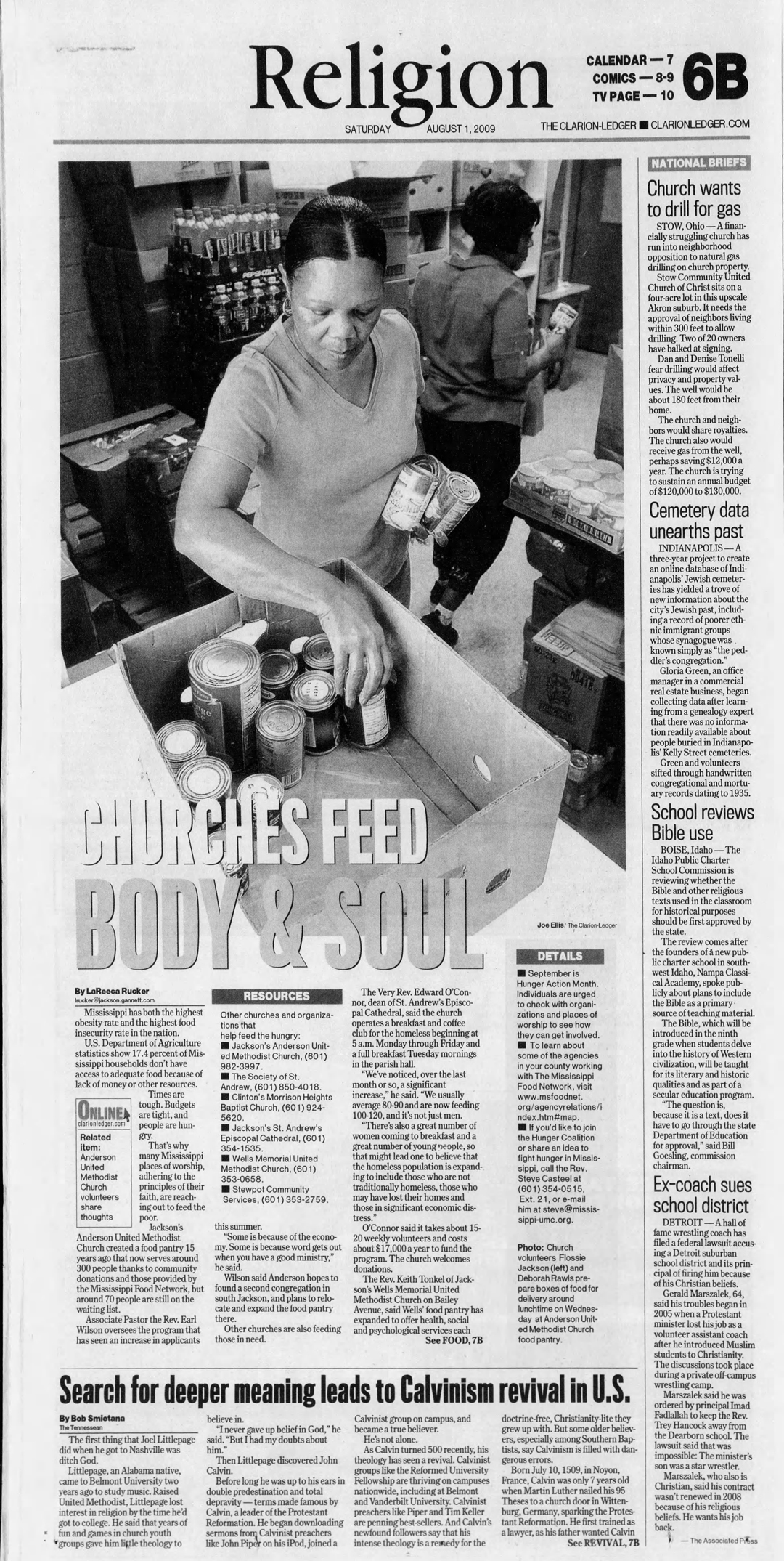Churches feed body and soul: Places of worship reach out to poor
LaReeca Rucker
The Madison County Herald
Mississippi has both the highest obesity rate and the highest food insecurity rate in the nation.
U.S. Department of Agriculture statistics show 17.4 percent of Mississippi households don't have access to adequate food because of lack of money or other resources.
Times are tough. Budgets are tight, and people are hungry. That's why many Mississippi places of worship, adhering to the principles of their faith, are reaching out to feed the poor.
Anderson United Methodist Church created a food pantry 15 years ago that now serves around 300 people thanks to community donations and those provided by the Mississippi Food Network, but around 70 people are still on the waiting list.
The Rev. Earl Wilson, associate pastor, oversees the program that has seen an increase in applicants.
"Some is because of the economy. Some is because word gets out when you have a good ministry," he said.
Wilson said Anderson hopes to found a second congregation in south Jackson, and plans to relocate and expand the food pantry there.
Other churches are also feeding those in need.
The Very Rev. Edward O'Connor, dean of St. Andrew's Episcopal Cathedral, said the church operates a breakfast and coffee club for the homeless beginning at 5 a.m. Monday through Friday and a full breakfast Tuesday mornings in the parish hall.
"We've noticed, over the last month or so, a significant increase," he said. "We usually average 80-90 and are now feeding 100-120, and it's not just men. "There's also a great number of women coming to breakfast and a great number of young people, so that might lead one to believe that the homeless population is expanding to include those who are not traditionally homeless, those who may have lost their homes and those in significant economic distress."
O'Connor said it takes about 15-20 weekly volunteers and costs about $17,000 a year to fund the program. The church welcomes donations.
The Rev. Keith Tonkel of Jackson's Wells Memorial United Methodist Church on Bailey Avenue, said Wells' food pantry has expanded to offer health, social and psychological services each Monday from 8 a.m. to 10:30 p.m. Some 20 weekly volunteers usually serve around 100 people.
"The hope is to help people move away from the cycle of poverty," he said. "It's important for churches to seek the needs that exist in the area where they find themselves."
Warren Yoder, executive director of the Public Policy Center of Mississippi, said hunger is a serious problem. "Families are cutting back on quality," he said. "They don't have enough money for food. That means kids who are not going hungry are having so many health problems because of their food. In some ways, we've gone backwards on nutrition issues for children.
"The food pantries and food banks have reported big increases in the number of people coming to them for food. Our unemployment is high. Food is, unfortunately, something you have to buy every week, and people have more month than they have money.
"We're publicizing the importance of working with churches to provide food, and to make sure they are providing good, quality food to help families through this tough time."
While some churches work independently to feed the hungry, others are working together. The most notable example may be Stewpot Community Services on West Capitol Street in Jackson that serves hundreds of meals daily.
Calvary Baptist, Capitol Street Methodist, Central Presbyterian, Galloway United Methodist, St. Andrew's Episcopal, St. Peters Catholic Cathedral and St. James Episcopal teamed to create and support the ministry that also provides shelter to the homeless, medical and dental care and child care.
The Rev. Steve Casteel, director of connectional ministries for the Mississippi Conference of the United Methodist Church, said his group also began working with other faith-based, business and governmental entities last year to establish a Hunger Coalition.
The goal is to create a statewide network of feeding services for the hungry and share that as broadly as we can," Casteel said, adding the group also is soliciting creative ideas that may help with its goal.
Thanks to a Mississippi Department of Corrections inmate who wrote a letter sharing his idea, Casteel said the Hunger Coalition soon may be able to acquire and distribute almost a million pounds of food farmed at the prison that would have gone to waste.
"It's been a really neat organic conversation that has evolved into getting more people at the table," Casteel said. "A lot of our food pantries are running out of food by the end of the month. People are losing their homes, their jobs, and they are finding themselves in a place where that's one of their only options.
"One of our long-term dreams is to turn Mississippi back into a breadbasket, and for us to not be the most malnourished and obese state,' but to get healthy and take some of this land that we're growing cash crops off of and put the crops in mouths."


